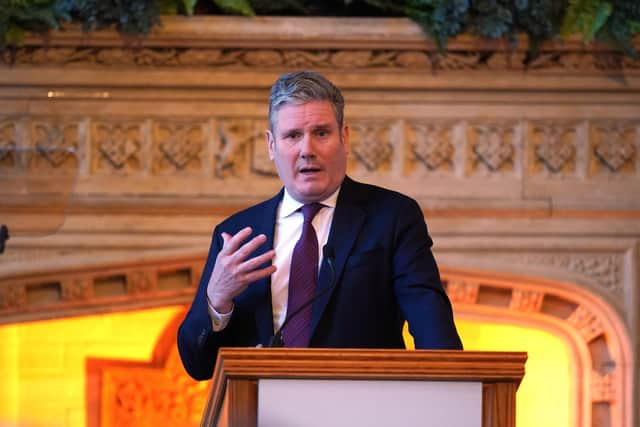Paisley rebuffs Starmer: 'It is Dublin - not London - that bears biggest blame for British-Irish breakdown in relations'
and live on Freeview channel 276
The DUP MP was reacting to a speech by Keir Starmer at Queen’s University Belfast yesterday, which centred for the most part on the Protocol and the anniversary of the Belfast Agreement.
Meanwhile party leader Sir Jeffrey Donaldson said that, whilst Sir Keir and others are lining up to heap praise on the 1998 deal, soon to have its 25th birthday, “few seem to recognise that the Protocol has eroded the foundations” of that agreement.
Advertisement
Hide AdAdvertisement
Hide AdSir Keir spent part of his second day in Northern Ireland visiting the Spirit engineering factory in Belfast.
But he began the day with an address before an audience at Queen’s.
In it, Sir Keir called for a “change of direction from the Prime Minister”, telling the audience “nothing has been more self-defeating than the determination of some Conservative ministers to see our friends in Dublin as adversaries on Brexit”.
He added: “That has damaged the political process here in Northern Ireland, no question. It’s certainly not the spirit of 1998.”
Advertisement
Hide AdAdvertisement
Hide AdHe also said: “The British government must normalise and strengthen relationships with Dublin.


“Honestly, relations should never have been this strained. Brexit was a rupture in the UK’s diplomatic stance, a call to change in every area of our society, which had to be recognised.
"I’ve been very clear about this. My government will make it work.”
He also stressed that whilst “we can find ways to remove the majority of checks” arising from the Irish Sea border, there must also be “conciliation” around the Protocol.
Advertisement
Hide AdAdvertisement
Hide AdUnionist anger about the protocol was “more than justified”, he said, as he pledged to support any deal which PM Rishi Sunak could reach with the EU that reduced the Irish Sea checks.
But he predicted the prime minister will face opposition from staunch Brexiteers within his own ranks, who want to see the protocol scrapped altogether.
“In the coming weeks, it’s possible there will be siren voices in Westminster that say again, there is another path, a path that doesn’t require compromise on the protocol,” he said.
“In fact, it’s possible those siren voices will include – may even be led by – the very people who created the protocol. That were cavalier with the constitutional settlement of this United Kingdom. That came to this island and acted – to be blunt – in bad faith...
Advertisement
Hide AdAdvertisement
Hide Ad“I would counsel that the example to follow is not theirs. But the spirit of negotiation, of conciliation, of courage, that, in the end, is always the force which moves Northern Ireland forward towards the future.”
Addressing the question of blame for the breakdown of British-Irish relations, Ian Paisley told the News Letter: “Keir Starmer’s views are, unfortunately, jaundiced, in that there is one reason why there’s been a breakdown in relationships between London and Dublin.
"It’s because of the misrepresentations Leo Varadkar vociferously made about the situation of the border in Northern Ireland, which so poisoned Europe, that the Protocol was the brainchild of that poisoning.”
Mr Paisley added that Labour will of course try and score points in GB by attacking the Tories, “but maybe he should be more fair and recognise that Dublin has a fair amount of responsibility for this breakdown in relationships”.
Advertisement
Hide AdAdvertisement
Hide AdHe said that “Leo Varadkar has a long way to go to heal that division”.
As to whether Labour ends up lending votes to the Tories in order to bless the result of the UK-EU negotiations over the Protocol, he said: “If the solution fails to address the problem which the Protocol has created, it doesn’t really matter if Keir Starmer and the Tories do a deal.
"If the Protocol is not resolved to our satisfaction, there’ll be no power-sharing Executive.
"So as long as the Protocol remains in place in its current form, there can be no power-sharing. Keir Starmer failed to grasp that nettle today, and maybe it’s understandable why – he doesn’t have the answer.”
Advertisement
Hide AdAdvertisement
Hide AdMeanwhile Sir Jeffrey said that while “there has been a welcome realisation” recently that “the cross-community consensus required for power sharing to function effectively has been lost”, “any negotiated outcome will only work if it can command the support of the unionist community – if it does not, then all the activities, discussions, and negotiations of recent months will amount to little”.
He added: “Sir Keir Starmer looked back at the importance of the principle of consent to the Belfast Agreement, and successor agreements, but few seem to recognise that the Protocol has eroded the foundations of that central pillar.
"No unionist MP or MLA supports the Protocol, yet it has been imposed on Northern Ireland... with its consequent harm caused to our delicate political arrangements. Progress has only ever been achieved in Northern Ireland when supported by both unionists and nationalists.
"It would be a mistake to think that ‘any old deal will do’ in 2023, and that such an approach and outcome would re-establish the local political institutions. This is not a time for creative ambiguity or sticking plasters.”